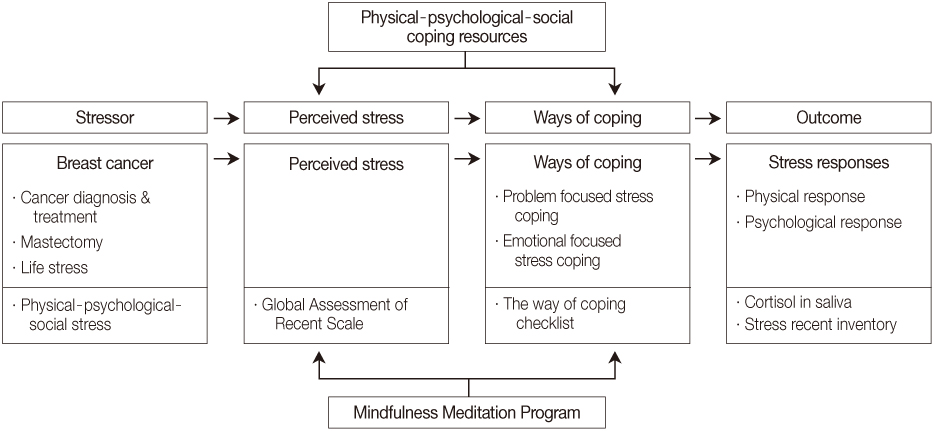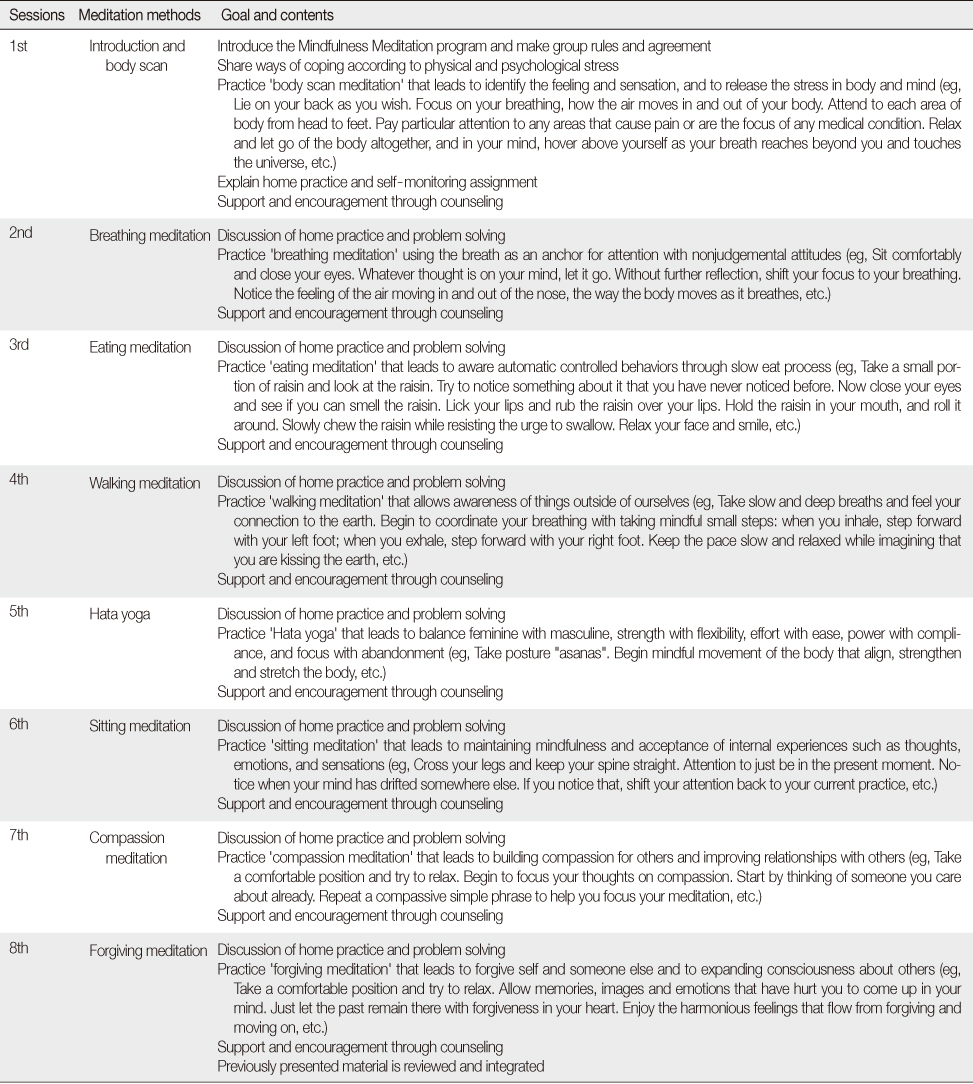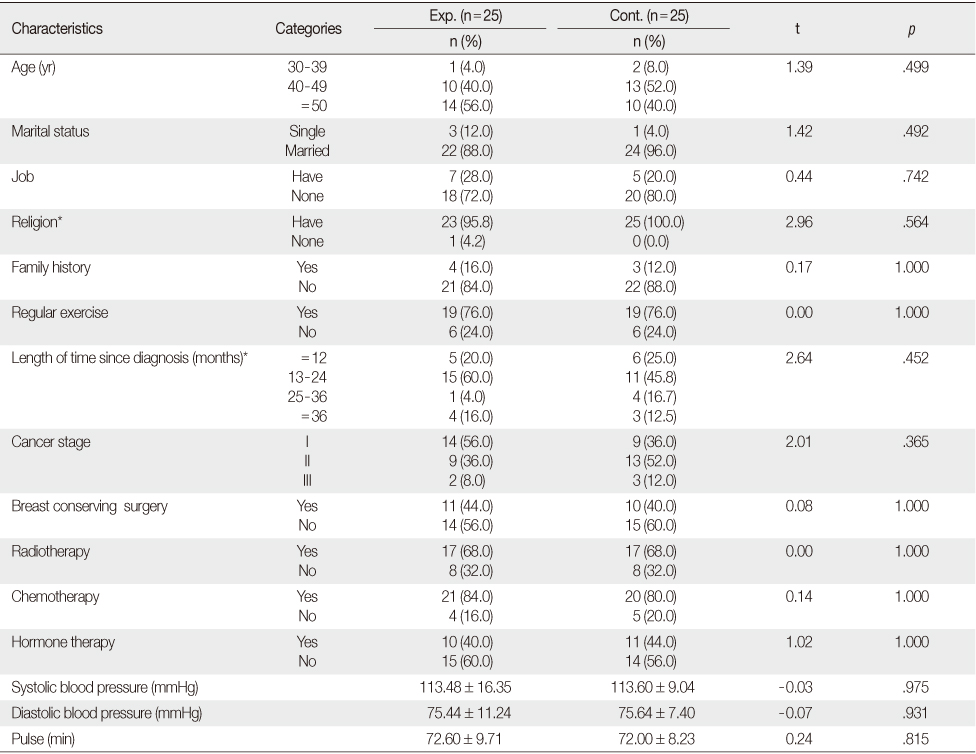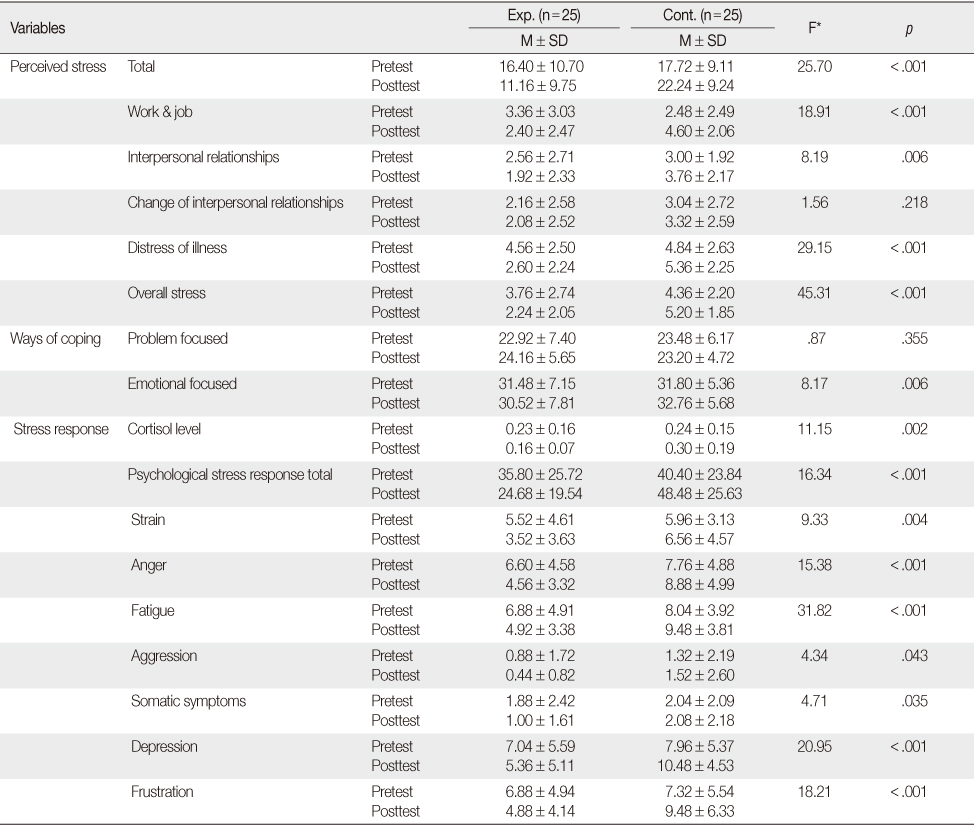Articles
- Page Path
- HOME > J Korean Acad Nurs > Volume 42(2); 2012 > Article
-
Original Article
- Effects of Mindfulness Meditation Program on Perceived Stress, Ways of Coping, and Stress Response in Breast Cancer Patients
- Gwangsoon Kang, Sangeun Oh
-
Journal of Korean Academy of Nursing 2012;42(2):161-170.
DOI: https://doi.org/10.4040/jkan.2012.42.2.161
Published online: April 30, 2012
1Full-time Instructor, Department of Nursing, Gwangju University, Gwangju, Korea.
2Professor, College of Nursing, CRINS, Chonnam National University, Gwangju, Korea.
- Address reprint requests to: Oh, Sangeun. College of Nursing, Chonnam National University, 5 Hak 1-dong, Dong-gu, Gwangju 501-746, Korea. Tel: +82-62-220-4354, FAX: +82-62-227-4009, seoh@jnu.ac.kr
© 2012 Korean Society of Nursing Science
- 1,747 Views
- 20 Download
- 26 Crossref
Figure & Data
REFERENCES
Citations

- The effect of personalized forest therapy programs on stress and obsessive-compulsive symptoms in patients with depression
Gayeon Kim, Sinae Kang, Kyungsook Paek, Youngeun Seo, Seyeon Park, Hyoju Choi, Gyeongmin Min, Neeeun Lee, Sooil Park, Saeyeon Choi, Pyeongsik Yeon
Frontiers in Public Health.2026;[Epub] CrossRef - The Effect of Mindfulness and Emotional Regulation on Self-care Competence Among Cancer Patients Undergoing Chemotherapy
Seri Son, Sunhee Lee
Cancer Nursing.2025; 48(3): e203. CrossRef - Effects of Fear of Cancer Recurrence on Coping Among Women With Cancer
Seri Son, Sunhee Lee
Cancer Nursing.2025;[Epub] CrossRef - The relationship between perceived stress, mindfulness, and sociodemographics among breast cancer patients in Saudi Arabia: a cross-sectional study
Sahar Abdulkarim Al-Ghareeb, Mousa Y. Asiri, Ahmad Aboshaiqah
Discover Psychology.2025;[Epub] CrossRef - Coping Strategies Among Filipino Cancer Patients Undergoing Radiation Therapy in Two Tertiary Care Hospitals in the Philippines: An Analytical Cross-sectional Study
Jose Ma. Zaldarriaga, Caissa Elvira Tangco-Abao , Manuel Martin Lopez , Juan Martin Magsanoc , Angela Peña-Camacho
Journal of Medical and Radiation Oncology.2024; 4(7): 18. CrossRef - Evaluating the Effect of Preoperative Provision of Information on Salivary Cortisol in Patients Undergoing Breast Cancer Surgery: A Randomized Controlled Study
Sara Pakzad Karamad, Ahmad Elahi, Fariba Tabari, Shima Haghani, Mohsen Fooladzadeh Dehghan, Mojdeh Navidhamidi
Journal of PeriAnesthesia Nursing.2023; 38(1): 63. CrossRef - Allostatic Load and Breast Cancer: a Systematic Review of the Literature
Emmanuel Obeng-Gyasi, Willi Tarver, Samilia Obeng-Gyasi
Current Breast Cancer Reports.2022; 14(4): 180. CrossRef - The effect of a supportive program on coping strategies and stress in women diagnosed with breast cancer: A randomized controlled clinical trial
Elahe Samami, Forouzan Elyasi, Seyed Nouraddin Mousavinasab, Leila Shojaee, Ehsan Zaboli, Zohreh Shahhosseini
Nursing Open.2021; 8(3): 1157. CrossRef - Coping Strategies-Oriented Interventions in Breast Cancer Women: A Systematic Scoping Review of the Quantitative Evidence
Elahe Samami, Forouzan Elyasi, Noraddin Mousavi Nasab, Leila Shojaee, Ehsan Zaboli, Zohreh Shahhosseini
Iranian Journal of Psychiatry and Behavioral Sciences.2020;[Epub] CrossRef - Self-Reported Parenting Stress and Cortisol Awakening Response Following Mindfulness-Based Stress Reduction Intervention for Parents of Children With Developmental Delays: A Pilot Study
Lisa R. Roberts, G. Griffin Boostrom, Salem O. Dehom, Cameron L. Neece
Biological Research For Nursing.2020; 22(2): 217. CrossRef - Effects of an Aging Management Program for Middle-aged Women on Resilience and Successful Aging
Hyeyun Jung, Kyung Mi Sung
Korean Journal of Women Health Nursing.2019; 25(4): 392. CrossRef - The Effect of Korean Mindfulness-based Stress Reduction Program on Perceived Stress and Depression for Mothers of Children and Adolescents with a Mental Disorder
Hyunsook Kim, Sungjae Kim
Perspectives in Nursing Science.2019; 16(2): 65. CrossRef - Effects of progressive muscle relaxation and mindfulness meditation on fatigue, coping styles, and quality of life in early breast cancer patients: An assessor blinded, three-arm, randomized controlled trial
Zehra Gok Metin, Canan Karadas, Nur Izgu, Leyla Ozdemir, Umut Demirci
European Journal of Oncology Nursing.2019; 42: 116. CrossRef - Effects of Mindfulness-Based Stress Reduction Program for Small and Medium Sized Hospital Nurses
Han Ju Bea, Young Eun
STRESS.2019; 27(4): 455. CrossRef - Mindfulness-based Stress Reduction Program for Psychiatric Inpatients
Hye Min Hong, Sun Joo Jang
Journal of Korean Academy of Psychiatric and Mental Health Nursing.2017; 26(3): 271. CrossRef - A preliminary randomised control trial of the effects of Dru yoga on psychological well-being in Northern Irish first time mothers
Deirdre Timlin, Ellen Elizabeth Anne Simpson
Midwifery.2017; 46: 29. CrossRef - The phenomenological study of self-management intervention among breast cancer survivors: Non-pharmacological approaches
Seok-Mo Heo, Narae Heo
Journal of the Korea Academia-Industrial cooperation Society.2016; 17(12): 270. CrossRef - The Effect of K-MBSR Program on Stress, Stress Coping Style, Depression, Anger and Sleep of Middle Aged Women
Jeong Min Park, In-Ryoung Choi
Journal of Korean Academy of Nursing.2016; 46(2): 194. CrossRef - Meditation for adults with haematological malignancies
Ines Salhofer, Andrea Will, Ina Monsef, Nicole Skoetz
Cochrane Database of Systematic Reviews.2016;[Epub] CrossRef - A systematic review of the effects of mindfulness interventions on cortisol
Karen O’Leary, Siobhan O’Neill, Samantha Dockray
Journal of Health Psychology.2016; 21(9): 2108. CrossRef - Impact of Cognitive Function and Cancer Coping on Quality of Life among Women with Post-chemotherapy Breast Cancer
Yoon Jung Kim, Sook Jung Kang
Korean Journal of Women Health Nursing.2016; 22(3): 182. CrossRef - The Effects of Mind Subtraction Meditation on Depression, Social Anxiety, Aggression, and Salivary Cortisol Levels of Elementary School Children in South Korea
Yang-Gyeong Yoo, Duck-Joo Lee, In-Soo Lee, Namin Shin, Ju-Yeon Park, Mi-Ra Yoon, Boas Yu
Journal of Pediatric Nursing.2016; 31(3): e185. CrossRef - The Influence of Stress, Spousal Support, and Resilience on the Ways of Coping among Women with Breast Cancer
Jiyoung Kang, Eunyoung E. Suh
Asian Oncology Nursing.2015; 15(1): 1. CrossRef - The Effect of a Community-Based Self-Management Program for Patients at Thyroid Cancer-Diagnosis Stage : a Pilot Study
Hyera Yoo, Sunjoo Boo, Mison Chun, Eun Mi Jo
Journal of Korean Public Health Nursing.2015; 29(3): 582. CrossRef - Effects of Mindfulness Meditation Program on Sleep, Depression and Quality of Life in the Institutionalized Elderly Women
Kyoung-Nam Kim, Hye-Gyeong Son, Hyun-Joo Park
The Korean Journal of Health Service Management.2014; 8(3): 157. CrossRef - The Effect of Mindfulness Meditation Programs on Nursing College Students' Perceived Stress, Depression, and Self-efficacy
Young-Ran Yeom, Keum-Bong Choi
journal of east-west nursing research.2013; 19(2): 104. CrossRef

Figure 1
Mindfulness Meditation Program
Homogeneity for Characteristics between Experimental and Control Groups
Exp.=Experimental group; Cont.=Control group.
*Except not response.
Homogeneity Test of Dependent Variables between Experimental and Control Groups
Exp.=Experimental group; Cont.=Control group.
Comparison of Subcategories in Perceived stress, Ways of Coping, and Stress Response between Experimental and Control Groups
Exp.=Experimental group; Cont.=Control group.
*F score is Analysis of Covariance with pretest scores as covariates.
Exp.=Experimental group; Cont.=Control group. *Except not response.
Exp.=Experimental group; Cont.=Control group.
Exp.=Experimental group; Cont.=Control group. *F score is Analysis of Covariance with pretest scores as covariates.
 KSNS
KSNS
 E-SUBMISSION
E-SUBMISSION





 Cite
Cite

